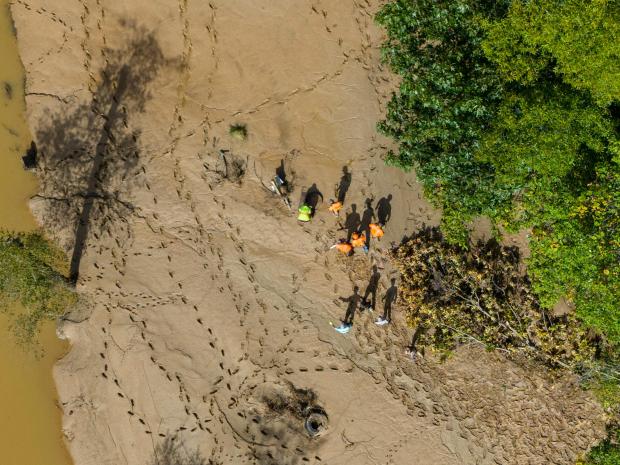Crown Point Deputy Fire Chief Ryan Cusack was deployed last week to assist in the response efforts following Hurricane Helene, which left behind such destruction Cusack said he didn’t know how to articulate it properly.
“I don’t have the vocabulary to describe it adequately, it’s that incredible. It gives you pause. You start thinking about the people that were affected by it. Even if they survived it, the time it’s going to take to clean up these communities, it’s very impactful,” Cusack said.
Hurricane Helene hit Florida on Sept. 26 as a Category 4 hurricane with wind speeds of 140 miles per hour and moved on as a tropical storm through a large portion of the southeast. As of Wednesday, the death toll in the wake of the hurricane rose to 170 people.
Now on his eighth deployment, Cusack said he is a member of Indiana Task Force One, where he serves as a K-9 search specialist or a search team manager, depending on the nature of the deployment.
The task force provides local law enforcement and emergency crews with support, Cusack said, and it completes the tasks local officials assign. In a hurricane response, Cusack said those assignments are typically area searches and damage surveys.
“We like to say that the response starts and ends locally. They’re the ones that are doing the work immediately as the disaster has happened. We’re able to come in and help them and supplement them and back them up,” Cusack said.
Crown Point firefighter Ryan Cusack and his K-9 partner Jake demonstrate an over-the-shoulder carry technique that was part of Jake’s training to become a disaster live rescue search dog. (Carrie Napoleon/Post-Tribune file)
Gov. Eric Holcomb announced Monday that he activated the Indiana National Guard to help with hurricane relief efforts in North Carolina. About 12 Indiana National Guard airmen with the 181st Intelligence Wing, based in Terre Haute, reported to North Carolina to join other Hoosier personnel responding to the hurricane, like Task Force One.
“Hoosiers stand with our friends in North Carolina as they navigate the devastation caused by this natural disaster,” Holcomb said in a release. “As a force for local and global good, the women and men of the Indiana National Guard are prepared to answer the call, and our prayers are with them and the people of North Carolina.”
Cusack was deployed to Florida on Sept. 24, he said, where the 80 members of Indiana Task Force One were pre-positioned in Pensacola to be ready to respond after the hurricane made landfall. The team then responded to Mayo, Clearwater, St. Petersburg and Tampa to help, he said.
While driving across the panhandle, Cusack said trees blocked the interstate for miles, and buildings along the road were severely damaged because of the strong hurricane winds.
On Sept. 29, Cusack said his team was then deployed to North Carolina to help with hurricane response. Speaking from McDowell County, just outside Asheville, on Tuesday, Cusack said flash flooding and landslides from heavy rainfall have caused damage.
“The sheer force and destruction that a flashflood and a landslide can bring to a town, it’s unbelievable.”
A large part of the hurricane response has been talking to residents in the community to see how they’re doing and if they’ve seen their neighbors or those living down the street, Cusack said.

“It’s just those little human interactions. The people here that were affected by it, they have a long road to go and we’re happy just to be able to help them in the short time that we’re here,” Cusack said.
It’s hard to compare or rank his deployments, Cusack said, because the cause of emergency varies, which means the response varies.
For example, Cusack said his longest deployment has been 21 days to assist in the rescue and clean-up efforts following the 2021 condominium collapse in Surfside, Fla. By contrast, Cusack said he was deployed to Florida in 2019 to respond to Hurricane Dorian, which was projected to be a Category 5 hurricane headed for Miami, but it never hit Florida.
But Cusack said he’ll remember this current deployment as significant in terms of the scope of the damage and the scope of the area impacted.
“It’s pretty incredible to come from Florida through the Carolinas and still have caused this much damage this far from the coast,” Cusack said.
As of Tuesday, Cusack said he didn’t know when he’d return home.
“They can keep us here as long as they need us. It’s already been a week, I would not be surprised if it was another week. Honestly, I don’t know. They could extend us two more weeks or they could send us home tomorrow,” Cusack said.
The Civilian Crisis Response Team will accept items, like baby formula, diapers, wet wipes, hygiene items, toilet paper and trash bags, through Thursday. Those who want to donate items can bring them to Ironworkers Hall Local 395, 6570 Ameriplex Drive in Portage, from 7:30 a.m. to 3 p.m. or at First United Methodist Church 352 S. Main Street in Crown Point from 9 a.m. to 4:30 p.m.
akukulka@post-trib.com



